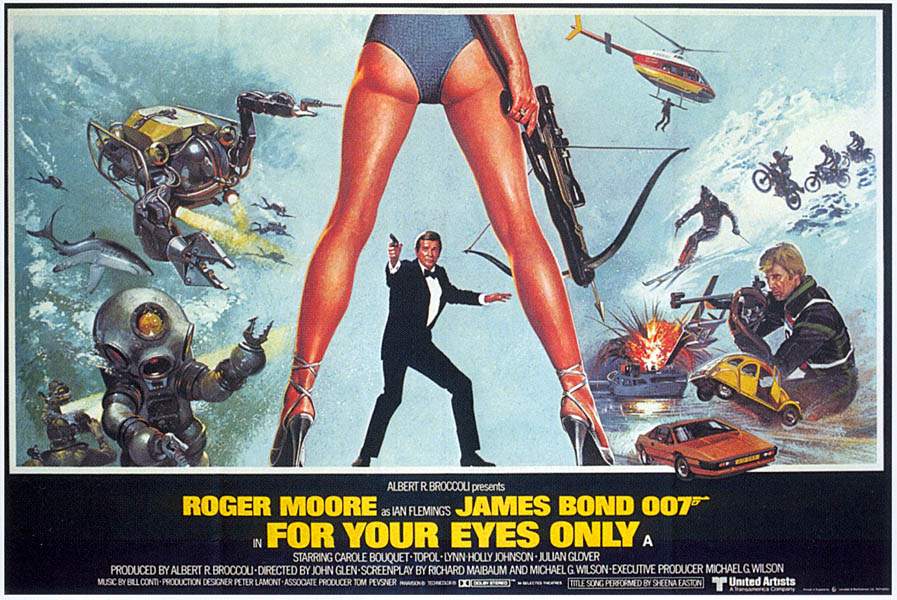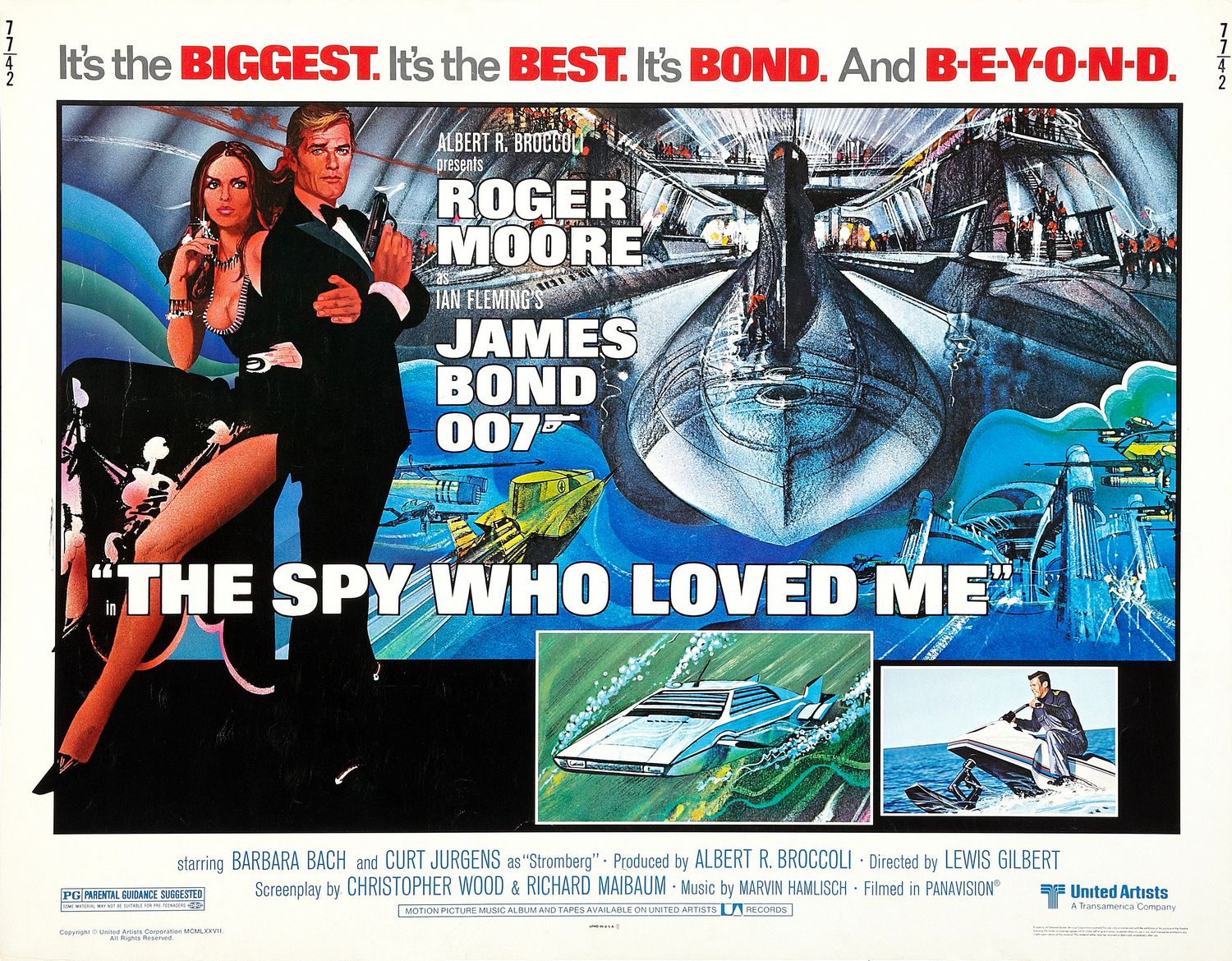Roger Moore passed away a month ago at the age of 89.
Officially (it’s a long story why I have to say “Officially”), he was the longest-tenured actor to play James Bond, making seven films (I guess he truly was 007) over twelve years, from Live and Let Die in 1973 to A View to a Kill in 1985 (and appearing in thirteen other films over the same period, a few of which I’d personally recommend).
To the surprise of some, I’m sure, he was also the oldest, so it’s natural that he’d be the first to leave us, but it makes the occasion no less melancholy.
It’s no secret how much I love James Bond. and with Moore’s death I gave some serious thought as to which 007 portrayal is my favorite. Honestly, in terms of overall body of work, I have to give it to Roger. Sure, Connery has my favorite individual movie (From Russia With Love), but Moore is just so charming, and so dryly humorous, and he clearly enjoyed what he did.
He often gets blamed for the “campy” turn the franchise took in the Seventies and Eighties, but as Isaac Chotiner so expertly pointed out, the writing was already on the wall with Diamonds Are Forever (I mean, that movie is Schlock with a Kapital K), before Moore was officially brought on board, so, blame Roger if you want, but, you’re wrong.
Anyway, in the wake of Moore’s passing, I was hoping somebody out there would put together a tribute screening, and, fortunately, AMC Theaters did just that (appropriately raising money for UNICEF in the process, for whom Roger was a long-time ambassador), and they did a good job of picking two out of seven choices (although I’m not sure why they were shown out of order at the screening I attended), in that they pretty much show the full breadth of the franchise, from down-to-earth to over-the-top (and, as most post-1969 Bond movies are either rehashes of From Russia With Love, Goldfinger, or You Only Live Twice, these two definitely fall in line).
My only nitpick is that neither of these films feature a score by John Barry, but I suppose you can’t have everything all the time.
Let’s get to it.
Original Release Date: June 26, 1981
Directed by John Glen
Written by Richard Maibaum and Michael G. Wilson
Cast: Roger Moore, Carole Bouquet, Topol, Lynn-Holly Johnson, Julian Glover, Cassandra Harris, Jill Bennett, Michael Gothard, John Wyman, Jack Hedley, Lois Maxwell, Desmond Llewelyn, Geoffrey Keen, Walter Gotell, James Villiers, John Moreno, Charles Dance, Toby Robins, Stefan Kalipha, Graham Crowden, Noel Johnson, Paul Brooke, Eva Reuber-Staier, John Wells, Janet Brown, John Hollis, Jeremy Bulloch, Victor Tourjansky
Soundtrack: Bill Conti
This has always been one of my favorites in the Bond franchise, and it’s definitely one of the most low-key (like if Mike Stoklasa got his wish and they made a live-action Batman movie where he just takes down one crime syndicate).
Not that For Your Eyes Only isn’t without it’s more over-the-top moments, e.g. the pre-title sequence where Bond dispatches of an unnamed “Blofeld” (that long story again), the hockey rink scene, and the “Margaret Thatcher” ending. But, by and large, it’s fairly reigned in; perhaps the grittiest of Moore’s tenure.
The basic outline is something of a cross-pollination of From Russia With Love and Thunderball, in that Bond has to track down a sunken MacGuffin device to make sure it doesn’t fall into the wrong hands, and there’s a gorgeous girl who’s closely related to it along for the adventure.
In terms of Bond movie elements, as silly as the pre-title sequence is, I like that it’s completely unrelated to the rest of the plot; this would only happen one more time in Octopussy (much like that cameo from Smithers, but we’ll talk about that later) and as of SPECTRE it’s still yet to happen again. I also enjoy when Bond has strong allies (a la Kerim Bey) at his side, and I like that Q gets to have a humorous moment outside of his lab, so these are pluses as well. Sadly, Bernard Lee died before his scenes could be filmed, so M is conspicuously absent.
As far as the cast goes, it may not be the longest list of all-stars (I’m still not sure why they cast Topol, but I’m not complaining; he’s great in this), but it’s well-assembled nonetheless (and how Julian Glover got to be in Star Wars, James Bond, and Indiana Jones is a delicious mystery). Everybody fills their roles nicely and helps bring out the appropriate emotional response to each scene. Nobody’s particularly flamboyant or scenery-chewing, but that’s fine in this movie. One might argue that the one sore spot is Lynn Holly-Johnson as Bibi Dahl, but I think she’s true to the character as written, so ultimately I don’t take issue with her performance.
I’d be remiss if I didn’t mention long-time Bond veteran but first-time director John Glen (who would helm the franchise for the whole of the decade) and first-time Bond cinematographer Alan Hume (who would see out Moore’s tenure, and also shot a little movie called Return of the Jedi). Most Bond films excel visually, but I particularly like the look of this one, especially all the magic hour stuff.
Really, I’d say For Your Eyes Only is just about the perfect Bond movie, except for one thing: no trains the music.
This is not to say that Bill Conti isn’t a fine composer in his own right, and, to be fair to him, there are at least one or two cues I really enjoy, but, on the whole, I don’t think he’s a fit, and his sound sticks out like a sore thumb in this context.
Other than that, it’s hard to complain. You’ve got James Bond, beautiful women, travel to a variety of locations, guns, cars, underwater photography, helicopter stunts, skiing, climbing, and Détente.
Outside of a train fight, what more could anyone ask?
(Speak of the devil and he shall appear.)
Rating: ★★★★½ (out of five)
Original Release Date: July 8, 1977
Directed by Lewis Gilbert
Written by Christopher Wood and Richard Maibaum
Cast: Roger Moore, Barbara Bach, Curd Jürgens, Richard Kiel, Caroline Munro, Walter Gotell, Geoffrey Keen, Bernard Lee, George Baker, Michael Billington, Desmond Llewelyn, Edward de Souza, Vernon Dobtcheff, Lois Maxwell, Nadim Sawalha, Eva Reuber-Staier, Robert Brown, Milton Reid, Cyril Shaps, Milo Sperber, Albert Moses, Shane Rimmer, Ray Hassett, Jeremy Bulloch, Victor Tourjansky
Soundtrack: Marvin Hamlisch
Ah, the first Bond movie of the post-Saltzman era (and post-Hamilton era; coincidence?).
The Spy Who Loved Me marks a return to BIG for the franchise. Wider widescreen, bigger sets (the 007 Stage at Pinewood Studios was first built for this film), bigger stunts (the parachute jump), bigger miniatures (not even joking), bigger henchman (Jaws), bigger frenemies (the Soviets are brought in like we’ve never seen before), etc., all of which are completely appropriate given that it’s the first of two consecutive rehashes of You Only Live Twice (this and Moonraker, which is another favorite of mine despite being the polar opposite of For Your Eyes Only), also directed by Lewis Gilbert (and both featuring Blofeld stand-ins, although I do enjoy Curd Jürgens in this).
As I said before, most Bond movies excel visually, The Spy Who Loved Me being no different (apparently Stanley Kubrick himself gave some secret assistance), but this one really lays on the old movie magic. From Ken Adam’s gigantic sets to Derek Meddings’ “miniatures” (honestly, this movie has some of the best model work I’ve ever seen; not that everything looks great, but certain things legitimately look plausibly full-size, and in water to boot) to the Lotus that transforms into a submarine, it’s hard not to feel a sense of wonderment when the movie goes big.
However, the film is unfortunately weighed down by a pair of albatrosses.
First off is Barbara Bach’s performance as Anya Amasova aka Agent XXX (GET IT!?). The less said about it, the better.
Second is Marvin Hamlisch’s score, which is crazy, because I have to dog a guy who’s not only an EGOT winner, but has a Pulitzer Prize on top of it. But, you know what? It wasn’t my decision to go Full Disco. That was his choice, and it was a poor one (to be clear though, it’s not the worst top-to-bottom score in Bond history). The title song is great though, I won’t deny that (even if it feels slightly out of place).
As far as the Bond movie elements go, this one makes heavy use of Bond’s Royal Navy cover, which I’m a big fan of, and we’re introduced to Robert Brown as Admiral Hargreaves (who would replace Bernard Lee as M in from Octopussy to Licence to Kill). We’re also introduced to Walter Gotell as General Gogol (M’s opposite number in Moscow), who would feature from this film through The Living Daylights. And there’s a train fight, which always makes me happy (even if it’s not nearly as good as the original).
In the end, The Spy Who Loved Me is number one (or close to it) on a lot of people’s Bond lists, but I’ve never seen it that way (feels like nostalgia over judgement to me). Not that I dislike it, I’m happy to watch it, I just think the general consensus is somewhat inflated. I recommend it well enough, but more so as a cultural touchstone than as a movie.
Although, it was Roger Moore’s favorite, which is a much better note to end on.
Rating: ★★★½ (out of five)
Nobody did it better.
Bond, James Bond. Nobody does it better. We remember Sir Roger Moore. pic.twitter.com/kalCFEslFY
— James Bond (@007) May 26, 2017
P.S.
For you Empire Strikes Back fans out there, in addition to Julian Glover (aka General Veers), Jeremy Bulloch (aka the guy in the Boba Fett suit) has a cameo as “Smithers” in For Your Eyes Only (and Octopussy), and is also a submarine crewman in The Spy Who Loved Me. And John Hollis (aka Lobot) plays the unnamed “Blofeld” during the intro of For Your Eyes Only.
You might also recognize Ray Hassett, who plays another crewman in The Spy Who Loved Me, who’s the guy who informs Han Solo that Commander Skywalker never checked back in to Echo Base (and also plays “Harry” the unfortunate policeman in Superman).



